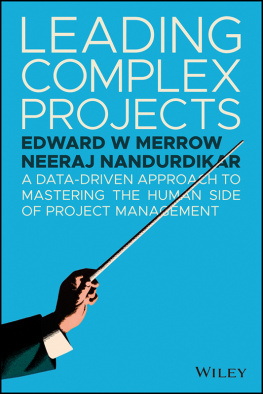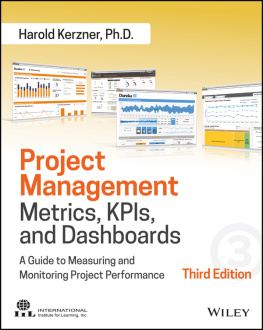
Cover Design: Wiley
Cover Image: CSA-Printstock/Getty Images
Copyright 2018 by John Wiley & Sons, Inc. All rights reserved.
Published by John Wiley & Sons, Inc., Hoboken, New Jersey.
Published simultaneously in Canada.
No part of this publication may be reproduced, stored in a retrieval system, or transmitted in any form or by any means, electronic, mechanical, photocopying, recording, scanning, or otherwise, except as permitted under Section 107 or 108 of the 1976 United States Copyright Act, without either the prior written permission of the Publisher, or authorization through payment of the appropriate per-copy fee to the Copyright Clearance Center, Inc., 222 Rosewood Drive, Danvers, MA 01923, (978) 750-8400, fax (978) 646-8600, or on the Web at www.copyright.com. Requests to the Publisher for permission should be addressed to the Permissions Department, John Wiley & Sons, Inc., 111 River Street, Hoboken, NJ 07030, (201) 748-6011, fax (201) 748-6008, or online at http://www.wiley.com/go/permissions.
Limit of Liability/Disclaimer of Warranty: While the publisher and author have used their best efforts in preparing this book, they make no representations or warranties with respect to the accuracy or completeness of the contents of this book and specifically disclaim any implied warranties of merchantability or fitness for a particular purpose. No warranty may be created or extended by sales representatives or written sales materials. The advice and strategies contained herein may not be suitable for your situation. You should consult with a professional where appropriate. Neither the publisher nor author shall be liable for any loss of profit or any other commercial damages, including but not limited to special, incidental, consequential, or other damages.
For general information on our other products and services or for technical support, please contact our Customer Care Department within the United States at (800) 762-2974, outside the United States at (317) 572-3993 or fax (317) 572-4002.
Wiley publishes in a variety of print and electronic formats and by print-on-demand. Some material included with standard print versions of this book may not be included in e-books or in print-on-demand. If this book refers to media such as a CD or DVD that is not included in the version you purchased, you may download this material at http://booksupport.wiley.com. For more information about Wiley products, visit www.wiley.com.
Library of Congress Cataloging-in-Publication Data is available
ISBN 978-1-119-38219-5 (hbk)
ISBN 978-1-119-38225-6 (ebk)
ISBN 978-1-119-38226-3 (ebk)
This book is dedicated to families.
First, the families of the authors who put up with the constant stress of our travel and yet happily encouraged us to write this book.
Second, our IPA family everyone at IPA who made our work possible by doing the difficult and exacting work of collecting data on thousands of projects and turning those data into useable information.
And third, to the family of project directors the project management family that we have come to know and embrace over the last several decades and from whom we continue to learn every day.
FOREWORD
All companies, governments, and even individuals desire to have their projects completed with success. In the industrial world, this elusive success has always been measured in terms of performance against project goals, normally quantified in terms of safety, quality, cost, and schedule. To be successful in today's regulatory and commercial environment requires that we deliver exceptional performance on all four of these measures. Many methods are available to track the goals and achievements of the desired performance. Yet, even with numerous methods, processes, and procedures, major projects continue to have significant failure rates (discussed in significant detail in Industrial Megaprojects by Ed Merrow). This new book provides additional insight into major project execution that looks beyond the usual processes and recognizes the critical factor: project success is all about people. Therefore, the true differentiator for project performance is the leadership of the people developing and executing the project.
With all the literature available on leadership, why should you spend your time with this specific book? I believe that the authors have captured the essence of creating successful projects with their analysis of leadership as it applies specifically to large industrial projects. This analysis builds upon the library of recognized experts such as Bennis, Goleman, and others. Using the proprietary database of Independent Project Analysis, Inc., which includes thousands of projects covering many industries, Ed and Neeraj have studied specific, successful projects. Through surveys and direct interviews, they have determined what each project leader did that helped his or her team to succeed. I think you will find valuable guidance in this book for the selection of the leader for your next major capital project, as well as keys to building an excellent project management organization. This can provide a basis for future success through investment in the people in your organization.
In the interview section of the book, the authors share insights from several successful project leaders. The varied backgrounds, industries, experiences, ways of handling teams and significant issues will provide valuable comparisons for your consideration. A consistent thread is the focus on teams and relationships to enable project success. These relationships include the supply chain for projects, including vendors and contractors, assuring an integrated process. In this book you will see the importance of values in driving project success. You will see how the personal values of the leaders create a shared culture in the project that governs how people communicate and trust each other to assure best-for-project decisions and keep projects moving toward success. Where the company culture aligns with the project culture, significant empowerment of the team provides an additional enabler of success. And where the right company culture doesn't exist, these leaders still often find ingenious ways to work around that and create inspiration and followership and still deliver success. That's what leadership is about!
I encourage you to read on and enjoy this fresh approach to understanding this driver of major capital project success.
Don Vardeman
Vice President of Worldwide
Project Management (Retired)
Anadarko Petroleum Corporation
ACKNOWLEDGMENTS
Just like any other project, the making of this book was a collaboration among a great many people, many of whom donated their time because of their belief in the importance of effective project leadership. First, we thank the 56 leaders of complex projects who completed our detailed survey as well as the complex projects that went with them. Without their help this would have been quite impossible. Second, we thank the seven extraordinary project leaders who were willing to sit for long interviews with us to deepen our understanding of how successful project leaders approach their important work. These seven are the real authors of Part II of this book.
We also owe a deep debt to those researchers whose life's work was essential to our analysis, particularly Lewis Goldberg, developer of the Five-Factor Model version that we employed, and Daniel Goleman, a central developer of the connections between emotional intelligence and effective leadership.
We also thank our external reviewers: Joseph C. Brewer, Jr., Paul Harris, Robert Don Vardeman, Murray Covello, and William Hederman. These gentlemen provided a practitioner's reading that enriched the effort. We would like to thank Jon Walker of IPA's research organization, who both pioneered some of the methodology we employ and was also kind enough to review some of the key chapters of the book. We also thank Lucas Milrod, deputy director of IPA Projects Research Division/Organization and Teams, who both reviewed chapters and provided answers to many questions about psychological research as we proceeded. Our thanks to Elizabeth Sanborn and Loretta Merrow, who reviewed some of the early chapters. We also thank Katya Petrochenkov, a senior research analyst in our UK office, who read and commented on the draft. We were helped throughout by Kelli Ratliff's eye for graphics, which she combines with knowing the substance, an unbeatable combination. Thanks also to our Wiley editor, Richard Narramore, and our Wiley team.
Next page










